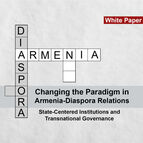
Illustration by Armine Shahbazyan.
If there is one country that has been able to create an innovative and efficient institutional framework to strengthen ties with its diaspora, it is Portugal. Portugal, this small Euro-Atlantic rectangle located at the western tip of the European continent, has always swung back and forth between Europe and the open sea. A country with a variable geometric dimension insofar as its relatively modest surface area (less than 100,000 km²) is overshadowed by the global influence of its language, spoken by 250 million Lusophones (Portuguese-language speakers) across the world.
The Portuguese presence in the world dates to the Age of Discovery and the colonial empires that followed. Since then, migratory flows to South and North America, Africa and Western Europe have never stopped and have even increased after the economic and financial crisis of 2008. As a result of this history, large communities of Portuguese have emigrated throughout the centuries.
Being aware of the importance of this Portuguese diaspora estimated at several million members, the Portuguese government celebrates its national holiday on June 10—officially named the Day of Portugal, Camoes and the Portuguese Communities—which also marks the death in 1580 of writer Luis de Camoes (considered Portugal’s greatest poet). The term “Portuguese communities” refers to the transnational Portuguese community. Their members are either recent immigrants or Lusophone descendants who left their country several generations ago, but were able to keep their Portuguese nationality under a law passed in 1981.
According to the Portuguese government, the idea of a global Portuguese community is seen as a strategic asset for the foreign policy of the Portuguese state. They are the strongest manifestation of a globalized Portugal.
How Lisbon Sees Its Relationship With Communities Scattered Around the World
A diplomatic network of consulates play an important role among emigrant populations, in coordination with other public bodies and partners. In May 1974, in the wake of the Carnation Revolution, which brought democracy back to the country, the Portuguese provisional government created a Secretary of State for Emigration under the aegis of the Ministry of Labor, later transferred to the Ministry of Foreign Affairs in 1975. Five years later, in 1980, a Secretariat of State for Portuguese Communities was created. At the same time, four MPs were added to the national parliament to represent the Portuguese diaspora in the national parliament.
In 1992, the Ministry of Foreign Affairs created the Camoes Institute, designed to promote the Portuguese language and culture in the world, similar to the British Council, Alliance Française, Instituto Cervantes and Goethe Institute. Headed by a diplomat, it works in close collaboration with the Ministry of Education and Culture. It has 16 centers around the world in Angola, Brazil, Cape Verde, China, France, Germany, Guinea Bissau, India, Japan, Luxembourg, Macao, Morocco, Mozambique, Sao Tome and Principe, East Timor and Thailand.
The Secretary of State and the Council of Portuguese Communities
The unicameral system of the Portuguese parliament allocates four seats to representatives of the Portuguese abroad: two for Europe and two for the rest of the world. But the originality of the Portuguese model lies in its political organization of the State-Diaspora relationship.
The State Secretariat for Portuguese Communities, a governmental body integrated into the Ministry of Foreign Affairs, works to serve the interests of Portuguese expatriates around the world. It acts as a facilitator of consular services, but sometimes also participates in humanitarian missions, as in the case in Venezuela, where a large Portuguese community is among those suffering from the deterioration of the socio-economic situation. The State Secretariat for the Portuguese Communities has a network of elected advisors who form the Council of Portuguese Communities. This is a government advisory body responsible for policies related to emigration and Portuguese communities in the world.
Composed of 80 members, elected for four-year terms by the Portuguese registered at consulates, the Council issues opinions on proposals and draft laws as well as on international agreements that may impact the life of the Portuguese communities. It produces information reports on the situation of the Portuguese in the world, and issues proposals and recommendations.
This council meets in plenary session once a year in Lisbon, and can convene additional special sessions if necessary. It is composed of several thematic commissions: the teaching of the Portuguese language and culture in the world, socio-economic issues, and consular and civic participation issues. It is also composed of five regional sections of the world (Europe, North America, Asia and Oceania, Africa, Central America and South America). The competencies of the regional councilors include sharing their opinions on matters related to their own geographical areas, identifying the cultural, artistic and economic potential of the Portuguese communities living in each of their areas.
However, it should not be forgotten that the usefulness of this consultative body is to facilitate the link between the Portuguese living abroad and the national administration. Hence, the creation of a “space for citizens” in each consulate and a dedicated application. In addition, the Portuguese Ministry of Foreign Affairs ensures that biannual meetings are held in each consular post with local members of the communities’ councils, and once a year with the Ministry’s diplomats in the embassies on topics related to the importance of the Portuguese communities and their role in the following areas: education, social affairs, economy, community life and culture.
Another aspect of the activities of the Council of Portuguese Communities is the census of the Portuguese abroad and their participation in the electoral process. At the same time, it is a question of guaranteeing assistance in all civic and administrative procedures for the Portuguese diaspora. This also includes assistance to the associative fabric of the Portuguese diaspora and social and medical assistance to elderly emigrants or those in precarious situations.
The role of the communities’ advisors also consists of encouraging investments by the Portuguese diaspora in the national economy through the sectors of tourism, commerce, industry, culture and health. In return, the Portuguese state is committed to assisting and promoting the businesses of Portuguese or Lusophone descendants abroad within the framework of the development of international partnerships and the dissemination of “emigrant assistance offices” (Gabinetes de apoio ao Emigrante – GAE) and diaspora investment assistance offices (Gabinete de Apoio ao Investidor da Diaspora – GAID).
The Council of the Diaspora and Mass Media
In 2012, a new body was created under the patronage of the President of the Republic: the Portuguese Diaspora Council. This private organization, recognized by the government as having the status of an NGO, is similar to an international network whose objective is the strengthening of relations between Portugal and the communities of the diaspora and all Portuguese who have been living abroad for at least three years. Its mission is to detect a network of talent and entrepreneurs who can, through their skills and influence, contribute to affirming the values of Portuguese culture and defend the national interests in the business world. Its main tool is the Portuguese Work Network. It focuses its work in four areas: economy, science, culture and citizenship. This international network has an executive of 11 members in charge of developing a strategic vision in the different areas and meets at least five times a year. The General Assembly is the supreme policy-making body and is composed of all members of the association; it is held annually in the presence of the President of the Republic and the Ministry of Foreign Affairs. The Diaspora Council has a network of advisors: 31 in the United States, 5 in Brazil, 6 in Asia, 6 in Africa, 38 in Europe, who are established in 26 countries and 50 cities. It publishes a magazine (Diaspora Lusa) for its members and the network.
Portugal maintains a link with its diaspora communities through the media, especially radio and television. The RDP Internacional station was founded in 1935 as Radio Portugal, with shortwave programs aimed at Portuguese people around the world. Today, it broadcasts a daily news bulletin dedicated to the life of Portuguese communities around the world: the Journal das comunidades. Furthermore, RTP Internacional, a free-to-air international public television channel, was created in 1992 in order to promote the Portuguese-speaking world and to serve as a bridge between Portuguese communities and the “motherland”. In addition to the programs, it broadcasts on public and private Portuguese channels, it also produces some programs specifically for the Portuguese diaspora. Broadcast worldwide by satellite, it is received by approximately 20 million homes.
It is thus armed with all these tools that Portugal intends to assert its place in the world while contributing to the strengthening of its relationship with the diaspora. The model can serve in many ways as a source of inspiration for the Armenian state.
Diaspora Models, Part 1: Switzerland
As prosperous as Switzerland is, it has long been and remains a country of emigration, however, there are a number of structures available to Swiss communities abroad to ensure an optimal relationship with the country of origin.
Read moreAlso read
Intellectuals of Armenia and Diaspora: The Quest for a New Paradigm
Writers and thinkers from Armenia and the diaspora are now linked, writes Tigran Yegavian, and argues that this rapprochement is indispensable for the liberation of Armenian thought.
Read moreThe Diaspora and the Challenge of State Building
Does the Armenian diaspora have a role in the process of state building? Tigran Yegavian presents a brief history of Armenia-Diaspora relations starting with Armenia’s independence and offers some insights to rectify the absence of an effective relationship.
Read moreWhite Paper
Changing the Paradigm in Armenia-Diaspora Relations
How should Armenia-Diaspora relations develop moving forward? This new White Paper argues that relations must be defined through state-centered institutions and transnational governance.
Read more





Very interesting but I would like to know if the Portuguese diaspora communities are structured like ours with political parties , 2 churches and other orgs. ? Selecting from Diaspora reps may create further division in our community. Furthermore, I assume their journal is in Portuguese only, something that cannot work for our communities. And finally, what would a journal like that have as content? Would have been interesting if the article could draw some parallels with our Diaspora Commission.